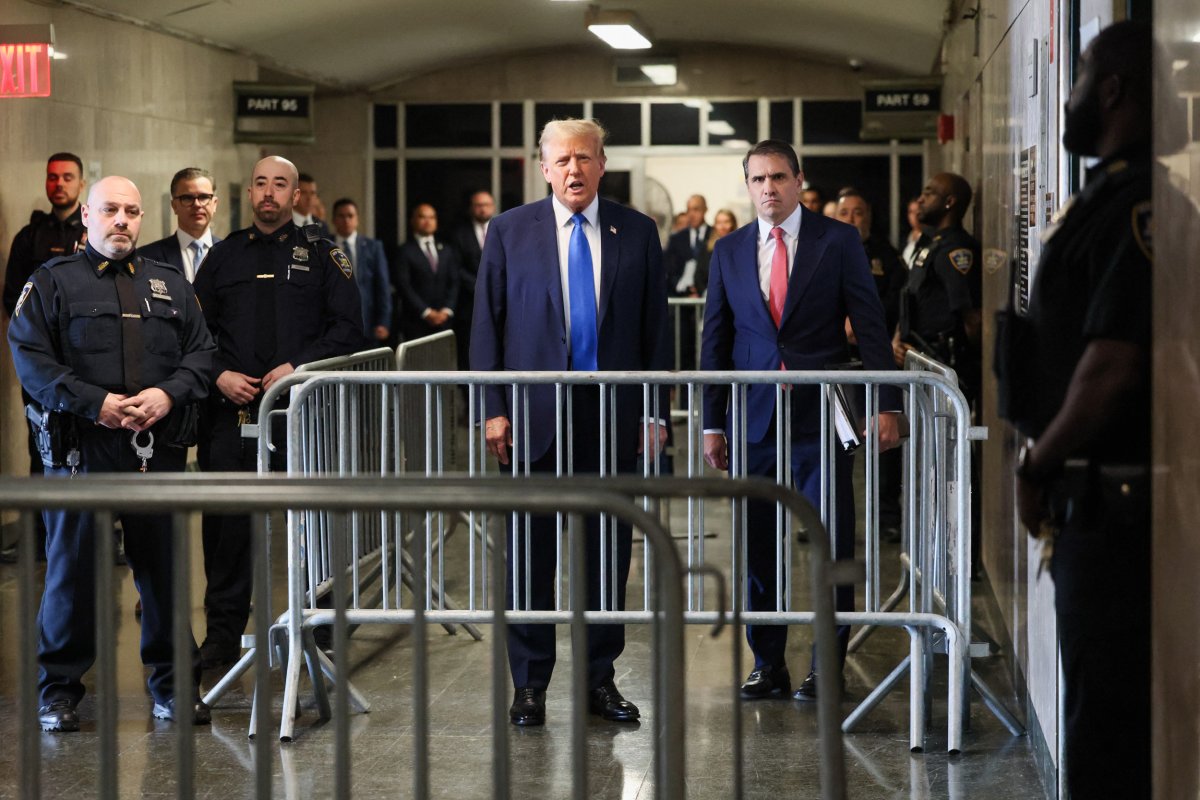Despite the hard-right Supreme Court's apparent willingness to entertain former President Donald Trump's fanciful claims of total presidential immunity, his New York criminal trial in the Stormy Daniels hush money case is not going especially well for him so far. And so, a once abstract possibility has become increasingly plausible: that the Republican nominee for president will need to deliver his acceptance speech and conduct his campaign from prison. If Trump is convicted, will the GOP nominate him anyway? How will that even work?
Though Trump has won the Republican nomination going away and long ago clinched the delegate majority needed to secure the party's nomination, he can't necessarily feel entirely secure given the massive legal jeopardy he faces and the pile of survey research showing that a significant slice of voters will vote against him if he is convicted of a crime. Yet while the state-by-state contests stagger on, zombielike, there is no sequence of events that could transpire at this point to give another candidate a shot at winning the nomination on the first ballot.
But that's not the end of it. Unbeknownst to most voters, both parties quietly maintain candidate nomination loopholes large enough to drive a MAGA convoy through. In 2016, Republican dissidents mounted an ultimately unsuccessful, last-ditch effort to deny Trump the nomination despite his clear delegate majority. On the surface that seemed impossible. While Rule 12 allows the RNC to amend most of its rules with a 3/4 majority, such amendments can't be made later than two years prior to the next convention. Additionally, after the 2012 convention, Republicans amended Rule 16, which now very clearly binds delegates to the candidate that voters chose them to represent at the convention. If delegates try to vote for someone else on the floor, Rule 16(a)(2) says that "such support shall not be recognized."

Yet Rule 16(f)(4) says that the RNC "may grant a waiver to a state Republican Party" from delegate binding rules "where compliance is impossible and the Republican National Committee determines that granting such waiver is in the best interests of the Republican Party." This waiver would be granted by the RNC's 29-member executive committee.
Because this has never happened, no one knows exactly what the waiver would say or allow the state delegations to do, but presumably it could free delegates to vote however they please on the first ballot. While no one really denies that this is possible, Trump's unusual pre-convention takeover of the RNC would seem to make this highly, highly unlikely. Last year Trump advisor Chris LaCivita said, in the colorful patois we've come to associate with the Trump cinematic universe, that "Any attempt by any swamp rat, by any Washington, D.C., swamp rat, to mess with the rules will be summarily crushed by those of us that know how to run conventions." Got it!
But let's say that Trump's polling nosedives after a conviction. If estimates of the trial's length are correct, it could conclude sometime in June, and if Trump is found guilty, there would be plenty of time to collect reams of polling data prior to the July 15th start of the Republican National Convention in Milwaukee. How bad would it need to get to convince an organization now dominated by ride-or-die Trump loyalists to consider dumping him?
There is no law that would prevent Trump from running for president from prison, but it is doubtful that many Republicans have actually sat down and contemplated what this would mean in practice. And they might be underrating just how disastrous and unworkable this would be for the Republican Party.
For starters, the GOP's vice-presidential nominee would effectively be the only face of the campaign, and Trump would be unable to hold campaign events, participate in debates, raise money at in-person events or do much of anything other than take his daily stroll around the yard with his fellow inmates and receive occasional visits from journalists. It would make a Rose Garden campaign look strenuous by comparison. And instead of allowing Republicans to focus on their criticisms of President Joe Biden, there would be a never-ending media circus around how the Republican nominee for president is a convicted felon in literal jail and would be prevented by statute from even voting in his home state of Florida.
That seems bad!
As Republican elites face this agonizing choice, they must also know that while Trump has a decent shot at winning from today's vantage point given Biden's own struggles, he is also an almost unique drag on the entire party's political prospects. Most polls showed former South Carolina Gov. Nikki Haley trouncing Biden in a romp before she dropped out of the race, and any Republican seen as an even remotely normal human being would be clearly favored against the president.
To nominate Trump after a conviction, then, would represent willful ignorance of the available evidence, and a commitment to the whims of the party's off-the-rails primary voters and their unhinged criminal of a party leader over the GOP's prospects as a viable national organization.
Yet that is almost certainly the path they will choose. They can't say they weren't warned.
David Faris is an associate professor of political science at Roosevelt University and the author of It's Time to Fight Dirty: How Democrats Can Build a Lasting Majority in American Politics. His writing has appeared in The Week, The Washington Post, The New Republic, Washington Monthly and more. You can find him on Twitter @davidmfaris.
The views expressed in this article are the writer's own.
Uncommon Knowledge
Newsweek is committed to challenging conventional wisdom and finding connections in the search for common ground.
Newsweek is committed to challenging conventional wisdom and finding connections in the search for common ground.
About the writer
To read how Newsweek uses AI as a newsroom tool, Click here.






